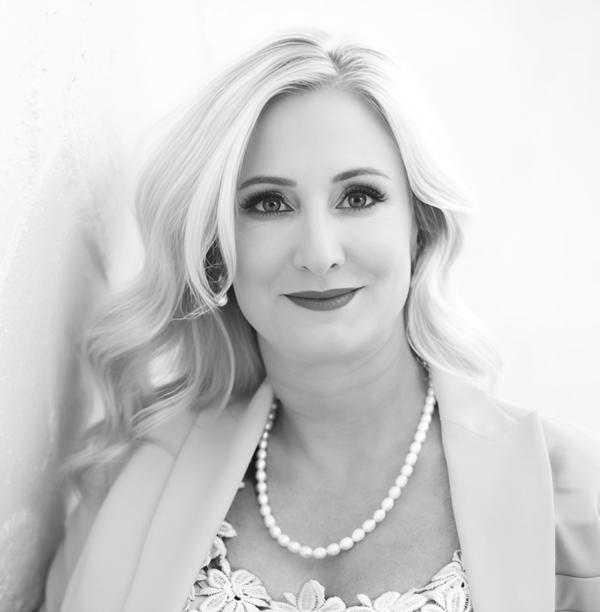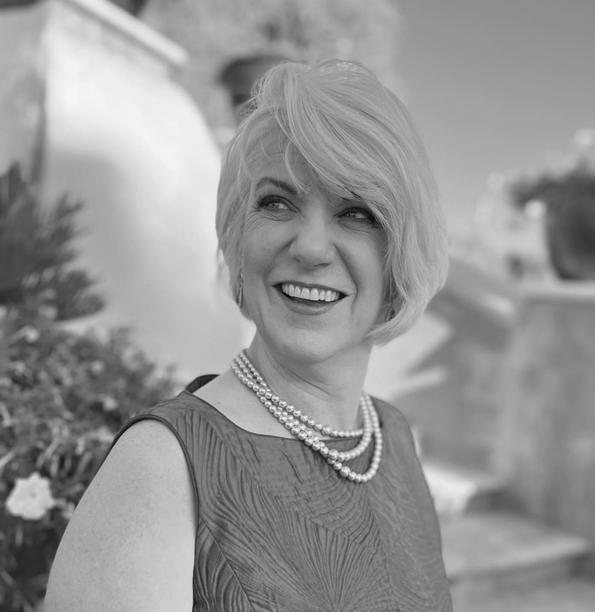
22 minute read
Creating A Ripple Effect Of Positivity: Influencing The World Through Kindness And Optimism
BY RENEE DUTTON
In a world often overwhelmed by negativity and challenges, it is important that we acknowledge and embrace our extraordinary power to make positive impact. The transformational power of positivity is an incredible force that can permeate every aspect of our lives, fundamentally altering our perspective and shaping our experiences, relationships, health, work, and overall well-being. When we cultivate a positive mindset, we transform our lives and influence and uplift those around us. Our mindset then becomes a powerful tool to help us navigate through difficulties, overcome obstacles, and create a ripple effect of positivity that can inspire and empower others. This will also open ourselves to a world of possibilities and opportunities that were previously hidden. In relationships, a positive attitude can work wonders in fostering deeper connections and nurturing healthier dynamics because it enables us to create an atmosphere of love and support. By influencing us to approach interactions with kindness, empathy, and a genuine desire to uplift others, positivity can dissolve conflicts, build trust, and strengthen the bonds that tie us together.
Advertisement
It allows us to see the best in others and to cultivate meaningful connections based on understanding and mutual respect.
When it comes to our health, the transformative effects of an optimistic mindset are astounding. Scientific studies have shown that positive thinking has been linked to lower stress levels, reduced risk of cardiovascular disease, enhanced immune function, and improved overall longevity. Through adopting a positive attitude, we can take charge of our health, making conscious choices that promote wellness and vitality.
I personally experienced the transformative power of positivity when lost my voice for nine months due to a surgery-related injury. Despite the unsuccessful attempts by top doctors and specialists to restore my voice, I refused to accept their opinions that would likely never speak again. Deciding to take matters into my own hands, I reinforced the strength and clarity of my voice through consistent daily affirmations and visualizations. intentionally surrounded myself with a supportive network of individuals and embraced holistic practices, firmly believing in the inherent capacity of my body to heal itself given the right conditions.
Over time, my voice gradually returned, defying all expectations. This experience taught me the profound influence our thoughts and beliefs have on physical well-being, exemplifying how positivity can shape our reality and help us overcome challenges.
Even scientific research supports the link between positive thinking and improved health outcomes. As we cultivate a positive mindset, we attract positive experiences, enhance problem-solving skills, and inspire others. One study by the University of Pennsylvania found that individuals with a positive mindset were more likely to experience lower levels of stress, improved physical health, and enhanced overall well-being. The research suggests that a positive attitude can boost the immune system, reduce the risk of chronic diseases, and promote longevity.
Other studies have shown that an optimistic mindset can lead to increased resilience in adversity. Research published in the Journal of Personality and Social Psychology demonstrated that individuals with an optimistic outlook were more adept at bouncing back from setbacks and were better equipped to overcome obstacles.
This resilience stems from the belief that challenges are temporary and can be overcome, fueling a proactive approach to problem-solving and a greater sense of personal efficacy.
These examples illustrate the incredible power of positivity to transform every aspect of our lives, enabling us to create a ripple effect of positive change that touches us and those around us.
The transformation begins within, as we consciously shift our thoughts, beliefs, and attitudes. With each step, we cultivate a brighter and more empowering reality, shaping a life infused with happiness, resilience, and boundless possibilities.
About the author:
Renee Dutton, known as The Positivity Maker, is an internationally acclaimed bestselling author and advocate for spreading the power of positivity. With a background in Broadcast Journalism and a deep passion for uplifting others, she uses her books, social media presence, and inspirational articles to empower individuals and help them unleash their true potential as they seek personal growth and self-improvement.


In her upcoming book, “The Sunshine
Effect: How To Light Up Your Life” releasing in the Fall, you’ll discover the science behind the power of positivity and how it enhances mental, physical, and emotional wellbeing. You’ll explore practical techniques for cultivating a positive mindset, such as gratitude, positive self-talk, and visualization, and delve into how positivity propels you towards achieving goals, fostering meaningful relationships, and building resilience in the face of challenges.

Whether as leaders, influencers, or individuals, embodying kindness, optimism, and a can-do attitude becomes a beacon of hope, igniting inspiration and transforming the world around us. These qualities hold immense potential to significantly impact a broader scale, spreading positivity and fostering a more harmonious and optimistic world. By embracing and embodying these qualities, we become catalysts of change, uplifting others, shaping a better future, and creating a ripple effect of positivity that reverberates far beyond our immediate sphere of influence.
In my life, have witnessed significant shifts in my overall well-being, success, and relationships by adopting a positive mindset. For example, when faced with challenges, I reframe them as opportunities for growth and learning, which allows me to approach difficulties with a solutionoriented mindset. Doing so eventually results in creative problem-solving and a greater sense of accomplishment. Let us harness the power of positivity, nurture it through daily practices, and watch our lives unfold with newfound joy, purpose, and fulfillment. Remember, when we embrace positivity, we transform ourselves and have the potential to create a ripple effect of positivity that spreads far and wide, making the world a brighter place for all.
Cracking The Stress Code: Discovering The Essence Within
Stress has become the norm in our fast-paced society, and nearly everyone experiences it to some degree. According to The American Institute of Stress Statistics, over 70% of people experience stress that negatively affects their physical and mental health.
Stress is commonly viewed as something negative to be avoided at all costs, which aligns with the World Health Organization’s definition of stress as “a state of worry or mental tension caused by a difficult situation.” However, the WHO also recognizes stress as “a natural human response that prompts us to address challenges and threats in our lives.”
What if the stress was merely a messenger calling our attention to what needs to be rebalanced for a better future?
Les Brown often mentions: “What you tune in to, you turn into,” - so are you tuning to the negative aspects of stress?
If so, your only solution may seem to be avoiding stress altogether.
What if the stress was neither inherently good nor bad? What if it was simply a signal? How would you choose to interpret it and respond to this signal?
Personally, would want to understand what it is signaling and how it can benefit me, as value personal growth and learning.
So what is stress signaling? Stress is based on our desires, expectations, and moral values. Challenges and obstacles only exist because we have desires, expectations, and moral values, so knowing these is essential to cracking the code to stress.
Let me provide an example. If you desire a productive workforce because you value effective work, you will see an ineffective workforce as an obstacle and be challenged by it. You may experience stress, as well as negative emotions and thoughts toward your staff.
On the other hand, another person who doesn’t share the same values or is less attached to their desires and values may view an unproductive task force as an opportunity for improvement. They may feel hopeful instead. This demonstrates how our attachment to desires, values, and expectations determines whether something becomes stressful in the negative sense of the word.
Therefore, wouldn’t the first step towards changing the impact of stress on us be to understand ourselves, including our desires, values, and expectations?
And wouldn’t the second step involve developing a mindset to effectively handle situations that contradict our desires, values, and expectations?
Knowing who you are and having strategies to rebalance yourself when
How To Cope With The Challenges And Uncertainties Of The Post-Pandemic World
myself felt overwhelmed when the pandemic hit, and it felt like the rug had been pulled out from under my life. Everything changed quickly, and suddenly, we found ourselves living in a strange new reality. Unable to follow my usual daily routine, turned to deep meditative practices to find a sense of calm in the chaos.
Meditation Meditation can be a form of prayer, a time to reflect on gratitude, or a time of awareness. It allows you to feel, and it does not have to be about clearing your mind, sitting in a specific posture, or chanting a specific mantra, because you can meditate faced with situations that don’t align with your values and expectations are crucial to building muscle for adversity and living a prosperous life. If you are struggling to identify your desires, values, or expectations, here are some questions to help you get started:
1. What are you so quick to give to others?
When are you there for others? For example, if you answer: “I give my help” or “I am there in a difficult situation,” you can infer that you value giving support. Now ask yourself, do I value receiving support too? If the answer is yes, then you value support in general.
If the answer is no, then something else that you value interferes with valuing receiving support. For example, you might not value receiving support if you value independence. Can you determine your value system this way?
2. What activities do you enjoy and why?
For example, you might enjoy watching movies because of the emotions they evoke in you. This suggests that you value experiencing emotions.
Now that you have identified some of your desires, values, and expectations, let’s focus on building an inner ability to deal with situations that don’t align with them. There is a mindset shortcut for this, but it only works if you believe it.
The shortcut is to believe that everything coming your way will help you in the future. Can you reflect on your life and recognize that your experiences led to subsequent ones? Can you now see that everything, positive or negative, contributes to your future?
Based on this, do you believe everything coming your way can help you in the future? If your answer is yes, you can ask yourself a simple question:
“What can this bring me?” This question can be applied to any situation, whether it aligns with your desires, values, and expectations. By asking this question, you open yourself up to new possibilities and insights, allowing each experience to guide you toward your goals, refine your values, or even reveal that certain desires are no longer necessary.
When you understand yourself— your desires, values, and expectations— and cultivate a mindset that embraces the opposite of those desires, values, and expectations, you can build the inner resilience needed to navigate situations that challenge you. This process begins with self-awareness and extends to developing strategies for rebalancing yourself when faced with circumstances that don’t align with your values and expectations.
It is crucial to recognize that stress, in itself, is not inherently good or bad. It is our perception and interpretation of stress, based on what we desire, expect, and value, that shapes its impact on our lives. Stress can serve as a valuable messenger, guiding us toward areas that need attention and offering opportunities for personal growth and learning.
Ultimately, building resilience and living a prosperous life involves figuratively "go inside," causing many people to become reflective. acknowledging our desires, values, and expectations and being open to the lessons and growth that can arise from challenging situations. By adopting a mindset that views every experience as a potential stepping stone to our future, we empower ourselves to harness the power of stress and use it as a tool for personal transformation.
So, the next time stress manifests, pause and reflect on what it might be signaling. Approach it with curiosity and the belief that it can lead you closer to your core values. As you begin to understand yourself and learn to embrace the opportunities within stress, you can build the inner strength necessary to thrive in adversity and create a fulfilling and prosperous life.
About the author:
Dr. Yasmine Saad is a highly acclaimed NYC psychologist, two-time international best-selling author, and peak performance coach who has been recognized by Forbes alongside Tony Robbins for her exceptional impact on empowering leaders. Known as “The Wise Psychologist,” Dr. Saad has developed the transformative Inner Message Approach™, enabling individuals to decode their thoughts and emotions, break free from negative patterns, and embrace their true potential.
As the founder of Madison Park Psychological Services, Dr. Saad leads an acclaimed practice dedicated to providing tailored psychological services and assessments. She has trained a team of the top 5% of psychologists nationally, ensuring exceptional care for multicultural clients. With her expertise in decoding thoughts and emotions, Dr. Saad has been invited to speak on prestigious national and international stages, sharing insights with leaders in self-development, including Deepak Chopra, Les Brown, Dennis Waitley, Brian Tracy, Bob Proctor, and many others. Her profound impact and innovative approach have been featured in over 100 media outlets, including ABC, CBS, NBC, BBC, Fox, USA Today, New York Post, Newsweek, Huffington Post, and Forbes, solidifying her reputation as a leading authority in psychology and personal development.
—Steve Jobs (quoted by Oprah Winfrey)
Restore Your Personal Leadership Power In A Narcissistic Relationship
Google the word “narcissism”, and you will get many definitions, including those from the American Psychiatric Association and the National Institute of Health. These brief descriptions, however, printed with tiny text in 2D black and white, pale in comparison to the life-sized full-color 3D with surround sound version that many have to deal with in their lives on a regular basis.
Facing a narcissist is similar to being in the front lines of increasingly intense battles. A narcissist, who overtly rages over or covertly lures you to leave your sense of self-competence and confidence, would often manipulate you into believing their downgraded perception of you. In extreme cases, you are left as a shadow of yourself, no matter how hearty in mind, heart, and soul you tell yourself you are.
Now, every day with a narcissist is not this dramatic. But if you are with one, you wake up every day wondering whether it will be. am talking about unhealthy narcissism here the kind that negatively affects one’s functioning in society.
My sessions with them have shaped their healing and journey to create contented relationships with ease of expression. Recovery from narcissistic relationships is not like taking an antibiotic for five days. It’s ongoing, with greater success over time and with help from supportive loved ones and experts.
Having A Narcissist Partner
When you are romantically partnered with a narc, the start of your relationship may have been a whirlwind of near perfection, so you think it MUST be the real thing, meant to be. Later on, you may find yourself feeling lonelier than when your coupling began, and you would wish to return to your “early days” together to recapture those moments you’d felt so seen and understood.
In stark contrast, your partner now makes decisions that affect both of you without your input, devalues you, and “forgets” about promises they’ve made you that they’ve never fulfilled.
Narcissist At Work for your children, or in your work, leading projects worth millions of dollars, how much this shift alone can cost you.
What, Then, Can We Do About Narcissism?
Dr. Ramani provides the premise for our next steps: “If you’re never going to be enough [as per the narcissist], one thing you need to do is stop exhausting yourself to try to be so. Every human being in the world comes into this world more than enough and exits this world more than enough.”
Our first step toward nipping narcissism in the bud is to recognize it. The good news is that awareness about narcissism has been widening globally, accompanied by a growing vocabulary to address narcissistic mannerisms. By arming yourself with the language of narcissism, you can: in any way that feels comfortable to you.
1. See whether you are dealing with a narcissistic person.
2. Effectively communicate your situation to those you subsequently go to for help.
My favorite meditative practice is to "shine" the light of my awareness within, basking in the warmth of my consciousness. This feel-good practice can be done in as little as five minutes, or you can bask in the light of your awareness for as long as you desire. Whether you prefer guided meditation journeys or to sit in the quiet practice of self-awareness, meditation done as a daily practice can be very centering.
Finding Purpose
The pandemic and lockdown revealed the need to literally and
For many, these inner reflections prompted a need for significant life changes, such as the "Great Resignation" that began then and continues until today - people wanted to find meaning in their lives; they weren't satisfied with their work environment, industry, or work-life balance. In mass numbers, they left their jobs in search of something more.
Finding purpose in my work became incredibly important after losing my home to a Northern California wildfire. worked for the government and, as such, was an official “emergency worker.” felt I had to show up at work even when my personal life was chaotic. Over time, realized I was not happy shuffling papers and doing “make work.” When I felt was wasting my time at work, it seemed my responsibilities outside of work should take precedence. If forced to be at work, would ensure my time was purposeful, and updated all the employee safety manuals to be aligned with current rules and regulations. This work had a purpose, which was to bring our organization into full compliance with state regulations.
Choosing To Be In The Present Moment Life does not come with a road map, and when we are embroiled in circumstances, it is easy to get caught up in the worries and fears of the future.
However, choosing to be in the present moment can ease your worries.
This mindfulness practice focuses your attention on everything present at that moment, like the feel of the air touching your skin, the sounds around you, and the sense of your body in the chair. Once you become self-aware and present in the moment, you can ask yourself, is the thing you are worried about happening right now? Being mindful is a practice that eases anxiety and helps you appreciate the world around you.
One very effective practice to focus your attention on the present moment is through breathwork: concentrating on your breath and noticing the airflow as it enters and leaves your body brings selfawareness and presence. In addition, specific breathwork breathing patterns can be used to calm your nervous systems, such as 4-7-8 breathing (breathe in for the count of four; hold for the count of seven, breathe out for the count of eight) or box breathing (breathe in for the count of four; hold for the count of four; breathe out for the count of four; hold for the count of four). When you focus on your breath, you are in the now-present moment.
Surrender To What Is
It's natural to want to have everything figured out and oversee your life, but there are limits to what you can control. Your resistance to the circumstances of your life is the fuel for your unhappiness. When you resist, you expend energy pushing against the events of your life. What if you accept your current circumstances and ask yourself, “What action steps can take to shift the energy?"
Instead of wasting your energy on resistance, you focus on positive action. When you let go of the need to control everything and trust that there is a plan for you, whether from God or the universe, you can let go and allow life to unfold as it's meant to.
It's easy to feel isolated and alone when practicing social distancing and staying at home. Yet we are all part of the same divine energy; through that understanding, we can find comfort in knowing we're not alone.

During the pandemic, wrote a blog post called "We are all connected."
I wrote about the energy inside our cells and the electrons in our atoms orbiting the nucleus. Our bodies are made of cells; our cells are made of molecules, and our molecules are made of atoms. We are energetic beings, and energy knows no bounds. Embrace this concept and feel how unlimited you are.
The practices and techniques offered here can help you cope with your mental health and the financial and political concerns that have surfaced during these challenging times. invite you to implement these practices into your daily life and see how they can positively impact your well-being. While you may not be able to control everything in life, you can choose how you respond to it.
Rebecca Zung, recognized as one of the top 1% of attorneys in the U.S and an expert negotiator with narcissists (“narcs”), synopsizes narcs more succinctly: “The narcissist devours people, consumes their output, and casts the empty, writhing shells aside.”
One thing Rebecca Zung and have in common is we not only help clients in narcissistic relationships in our unique ways, but we’ve also experienced toxic narcissism up close and personal. And while medical research has not yet revealed exactly what factors cause narcissism, we do know that narcissists cannot sustain a consistent positive self-image, so they overly rely on others to confirm their worth.
The Impact Of Narcissism
Cleveland Clinic cites expert quotes of up to a 5% prevalence of unhealthy narcissism, labeled as Narcissistic Personality Disorder (NPD) among medical professionals. But when you factor in all the family, friends, and coworkers that those 5% relate with, the prevalence of people experiencing the effects of NPD climbs substantially.
A Narcissist At Home Confucius posited, “To put the world in order, we must first put the nation in order; to put the nation in order, we must first put the family in order...”
This is very challenging to achieve when a family is run by a narcissist. Not just stranger danger is etched into an innocent’s heart at an early age when one’s parents or siblings are narcissistic.
Many of my clients raised by narcissists have shared their experiences:
• How they were denied emotional expressions like anger or hurt over selfcentered parental treatment;
• How early in life they learned that parental love is conditional; and

• How they’d work overtime to please or appease their parents.
Whatever “misbehavioral” tools a narcissist decides to pull out from the toolbox at home can also be used in modified form to control people at the office, as the narc exploits others at work for personal gain. Imagine how many adults in this country alone are still living through the effects of having been raised by or with narcissists. Now mentally double their potential magnitude: whether one experiences narcissism in the biological family, work family, or both, the results can be destructive. When a narcissist wends their way into a leadership position at work, their acting without integrity creates communication breakdowns, trust issues, and many other problems.
In a research paper published in September 2021, Jennifer Chatman, the Paul J. Cortese Distinguished Professor of Management at UC Berkeley and the study’s lead author noted, “Narcissistic leaders affect the core elements of organizations and their impact on society….Companies organize because they can do something together that no individual can accomplish alone. When narcissistic leaders undermine collaboration, they, by definition, reduce the effectiveness of an organization.”
Physiological Effects Of Dealing
With A Narcissist Repeatedly being narcissistically manipulated is stressful. This puts us on edge, reducing our focus and concentration on problem-solving and decision-making. When we’re more stressed, even simple decisions may seem complicated, and the quality of our decisions may suffer. And as we take more time to deliberate, we take longer to decide. At the end of the day, we’ve made fewer decisions, and the quality of those decisions can be compromised.
You can see how relating to a narcissist over time can considerably downshift your mindset, self-concept, and performance. Visualize yourself with your family, caring
3. Use available resources to develop a social support network and better understand your narcissist. These might include nonprofit organizations, spiritual centers, and support groups.
4. Find experienced narcissism professionals to help you more efficiently and effectively strategize and navigate toward your intended mental, emotional, and spiritual health goals. Forbes council member Erin Urban has said, “relationships established with more experienced professionals usually allow mentees access to additional knowledge depth. These types of partnerships can be transformational.”

Prada’s Narcissistic Relationship Story: A Story Of Possibility
Raised by narcissistic parents, Prada is a private client of mine. She started seeing me when she was in a covert narcissistic relationship with someone who continually shifted expectations, did not hold himself accountable for misdeeds, and did not express empathy for Prada. He demeaned her, first in private and then later occasionally among others.
During our time working together, Prada realized he was different from how he originally advertised himself. Nor was she the failing partner, often letting him down as he’d painted Prada to be.
Prada grew to discern his manipulative ways as she discussed relationship scenarios with me. She started successfully predicting his behaviors and memorized his deeper motives, and learned fruitful ways to respond to his narcissistic acts to help preserve her peace of mind. She picked up new protocols to process her feelings for improved emotional hygiene, and most importantly, Prada awakened to her ever-present power of choice. Over our subsequent sessions, she gradually strengthened her mindset and resolve enough to leave him permanently.
Prada adopted new coping skills and healthier ways to handle her transition through my mentoring sessions with her. Prada also took an irresistible offer for a much higher paying corporate job. Turned out her new boss was a raging narcissist. As Prada is quite capable and compassionate, he worked her harder than the others. In her second narcissistic relationship round, she was more empowered. Prada strategized to cover her financial needs and enrolled in further education with the ultimate plan of starting her own business. She is undaunted in doing what it takes to reach her vocational goal, has not rebounded romantically with anyone, and acknowledges her achievements with pride, knowing she’s worthy of getting whatever she wants in life for herself.
Reducing Narcissistic Influence
And Effect
If you ever find yourself partnered up personally or professionally with a narcissist, I’d love for you to surround yourself with healthy, trustworthy support, advocacy, and guidance, reclaim your power, and move successfully toward all of life’s blessings waiting for you! Have any questions about narcissism arisen for you? Check out my website Https://yveruiz.com/yve for more resources that can help you in your journey.
Confucius’ insight feels especially relevant today: “...to put the family in order, we must first cultivate our personal life; we must first set our hearts right.”
About the Author: Yve Alexandra Ruiz earned her medical doctorate at UCLA School of Medicine, completing residencies in both family medicine and psychiatry. She is the creator of narcissism, leadership, and Ultimate Confidence Mastery programs, inspiring and motivating women to own their power for decades. In a program funded by the Jim Casey Initiative, Yve has mentored prior sex slaves from Honduras even while their traffickers were put on trial. This year at the renowned national Conscious Life Expo promoting a socially conscious and sustainable lifestyle in LA, Yve was invited to run their first-ever workshop on the topic of narcissism, with standing room only, called Banishing Your Energy Vampires. She has guested on inspirational podcasts and other online shows, including Manny Lopez’ From Orphan to CEO, The Healing Heart Podcast, The Mentors Studio, ParentPumpRadio. com, Damian Bertrand’s Tuesday afternoon LATalkRadio.com show.
Most recently, Yve is a co-author in rising star LA Tribune CEO Moe Rock’s book “The Moral Compass: 28 Principles for Integrity-Driven Leadership.” work closely with our clients to develop personalized plans while considering their goals, lifestyle, and preferences.
Angela has shared the stage with Les Brown, Dr. John DeMartini, Bernardo Moya, Michael Beckwith, Joe Vitale, Alison Larsen, Moe Rock, David Fagan, and many others. Angela has done everything from speaking to C-suite level entrepreneurs about emotional intelligence to creating engaging children’s videos. When she isn’t writing children’s stories, she can be found hiking in the beautiful wilderness of Taos, New Mexico.
Beginning your health and wellness journey can be daunting. With so many different ways to lose weight, build muscle, and develop healthy habits, it can be challenging to know where to start.
You might ask yourself, “What workouts should do?” or “What foods should eat?” And let’s face it, we all want quick results like those Instagram fitness models who promise a perfect physique in just four weeks. But the truth is, it doesn’t work that way. Great things take time, and building a solid foundation is crucial to achieving long-term success.
As John Heywood once said, “Rome wasn’t built in a day, but they were laying bricks every hour.” And that’s precisely what you must do - lay a brick on every aspect of your life that you want to change, then build that solid foundation. Fitness is more than just the bodily physique; it’s discipline, strength, confidence, and wholeness with your overall well-being. A healthy, nutritious lifestyle gives your body energy and strength and aids in achieving the mental and physical results you want.
This is why created the Fit Female Society a community of women empowerment that aims to enable women to live their best lives by helping them achieve their health and fitness goals.
Through coaching and support, the Fit Female Society helps women build confidence, improve their physical and mental health, and create lasting lifestyle changes. Whether you want to lose weight, build muscle, have more self-confidence, and develop healthy life habits, this is the women empowerment community for you! Here are five things to know when starting your health and wellness journey.

1. Know your desired goal, then come up with a plan. You can only reach that success if you know what you’re aiming for. A few examples of realistic goals: I want to lose 20lbs., I want to have a positive mindset, or want to cut out soda from my diet. You get the gist of it. Now, come up with a plan of action to get there.
2. Find a professional if you need help figuring out the goals yourself and need some extra guidance.
3. Get ready to be consistent at working towards your desired goals. It won’t be easy, but it’s possible if you want to make the change and become a better version of yourself. Remember, in order to become different, you must do different things. You won’t become different or greater by doing the same old things you already do.
4. Have strong self-belief. Not everyone will be supportive of you, and that’s okay. Hang on to the people in your life that positively influence and support you, but your greatest fan and cheerleader should be yourself. Believe in yourself even if others don’t see your vision.
5. This is the big one: NEVER GIVE UP! Keep in mind that great things take time. Sometimes, we want to give up when we don’t get those results right away, but there will always be something to celebrate, and that’s YOUR PROGRESS. Focus on PROGRESS over perfection. Take it one day at a time, and eventually, you’ll achieve your goals.
May this article empower you to become your best self, be patient, and never give up. Follow the Fit Female Society on Instagram, Facebook, and YouTube for more helpful tips on fitness, nutrition, and wellness to help you with your lifelong journey of personal development.
About the author:
Valaery Rose Hernandez is a mother, educator, transformational life coach and entrepreneur who enjoys positively impacting the world around her through teachings of fitness, nutrition, wellness, empowerment and personal development, which ultimately inspires life long change in those who seek it.




